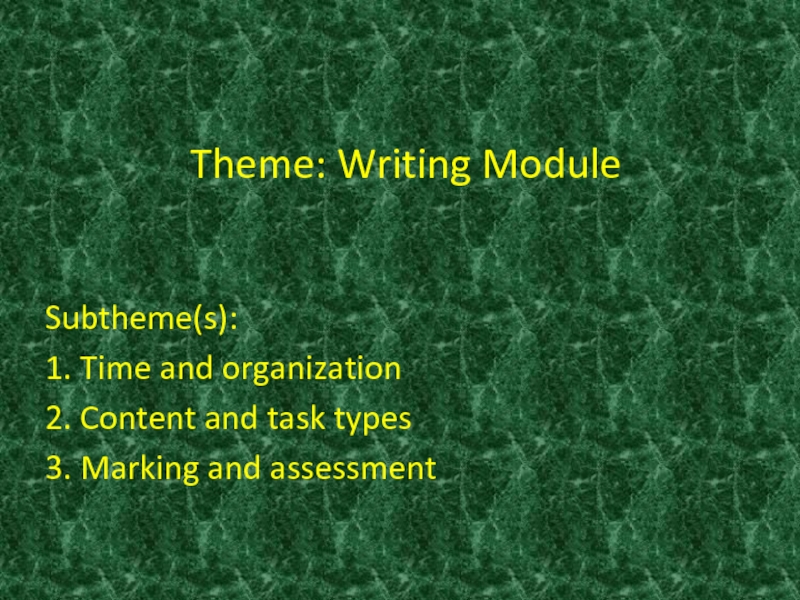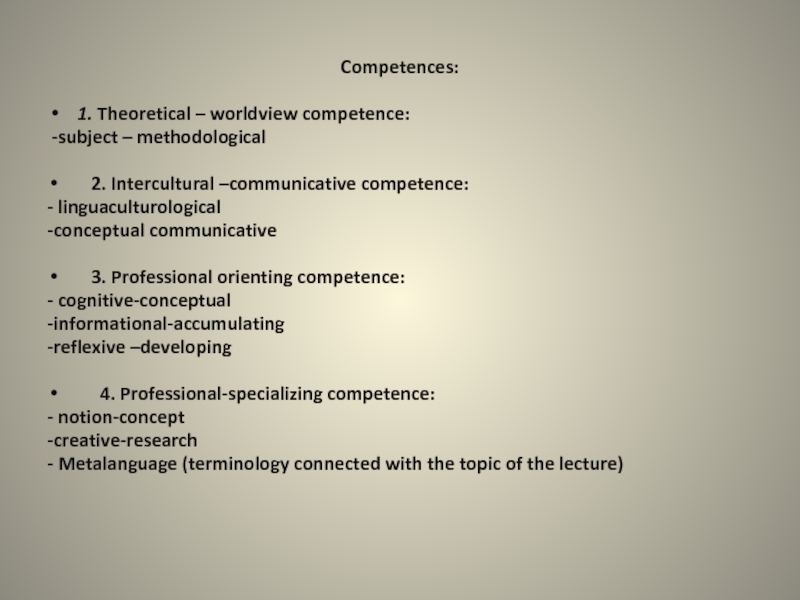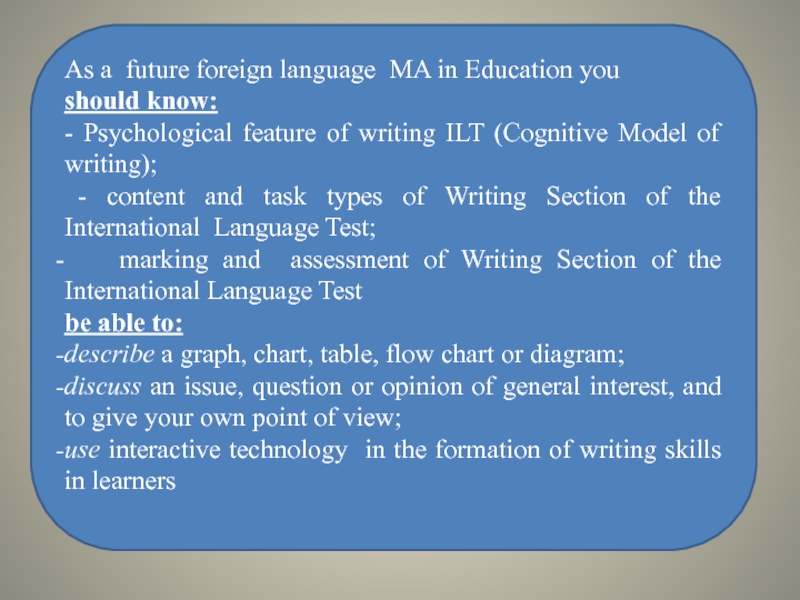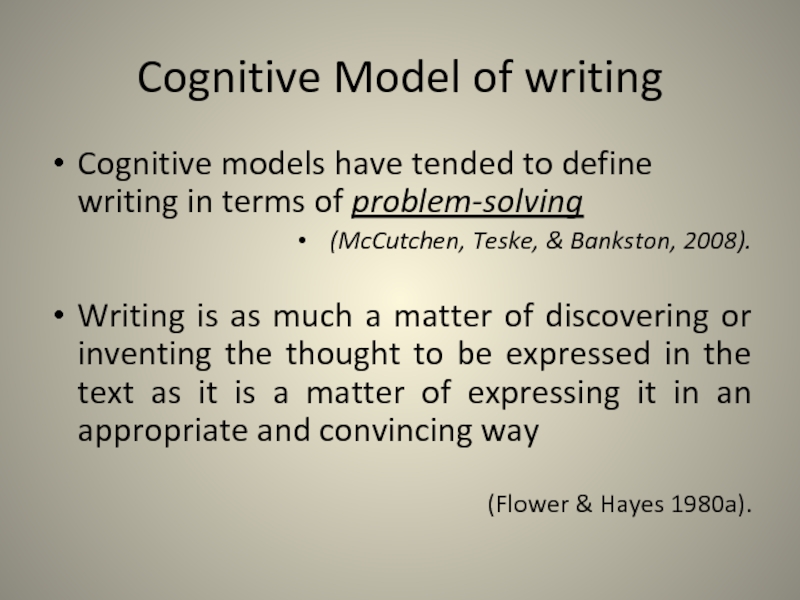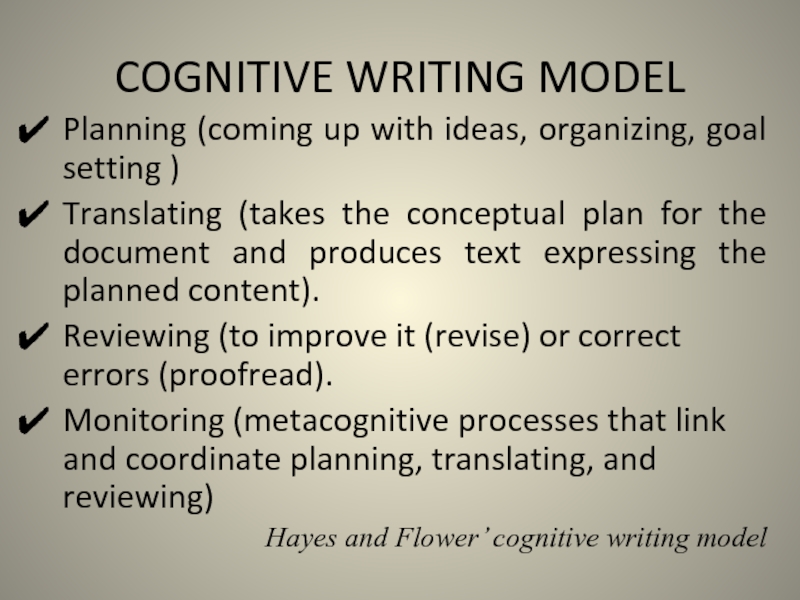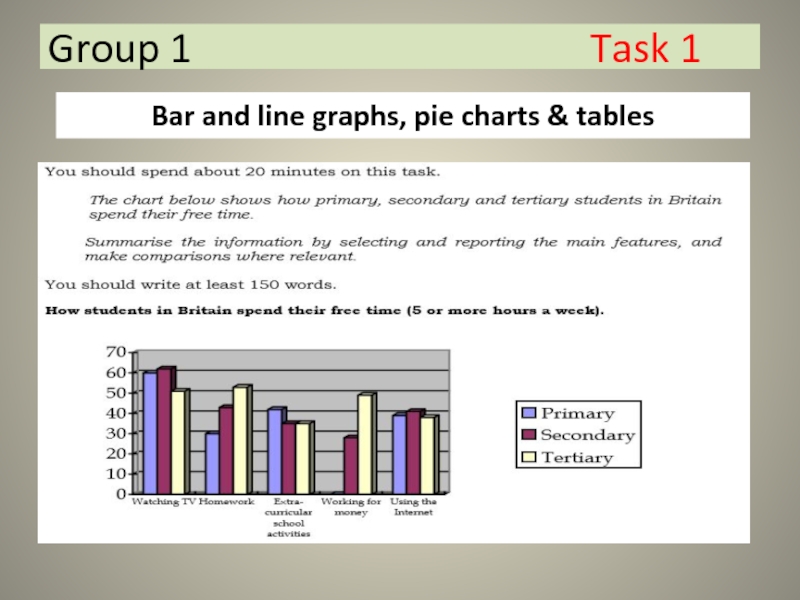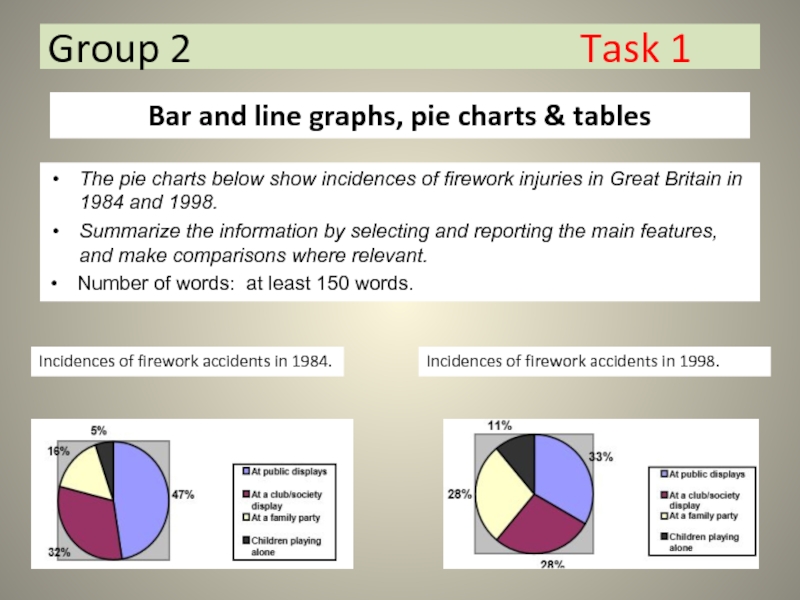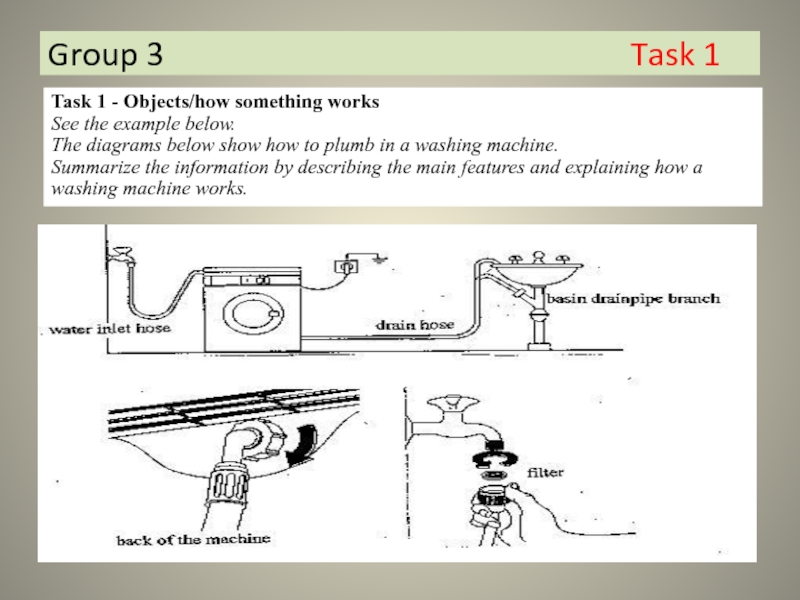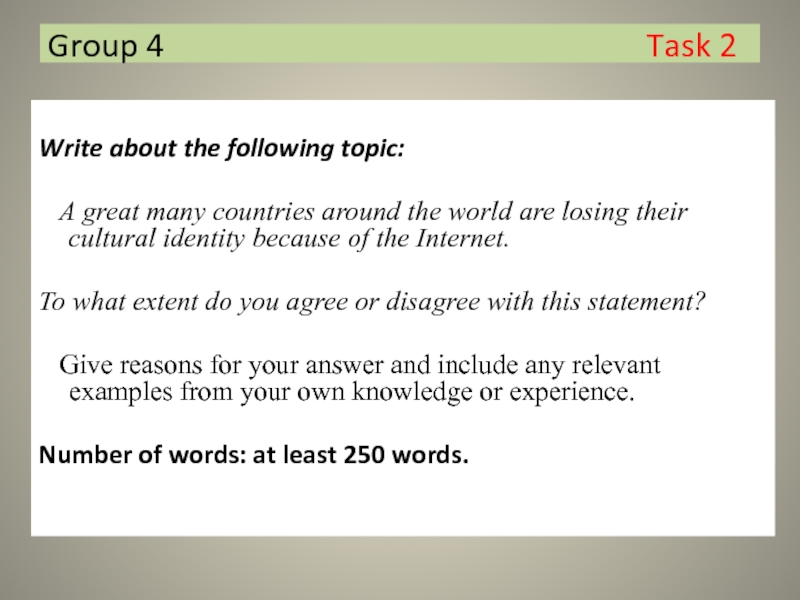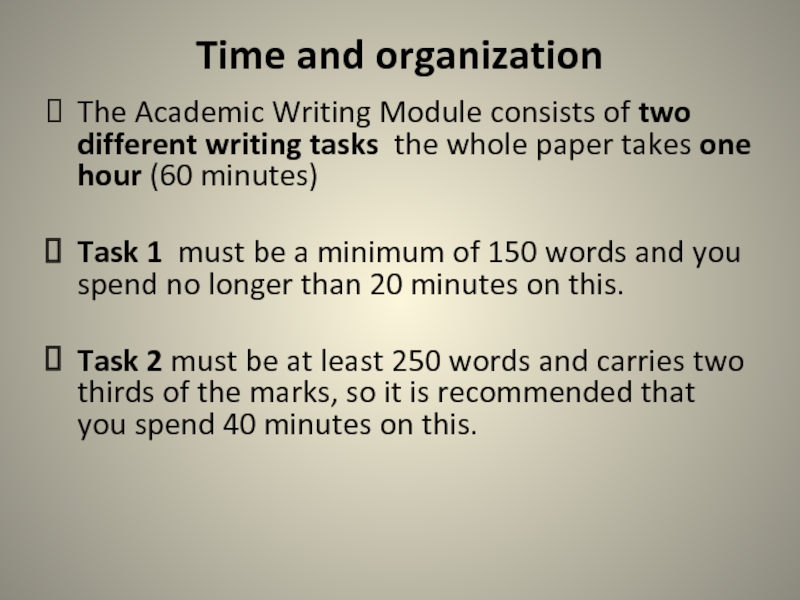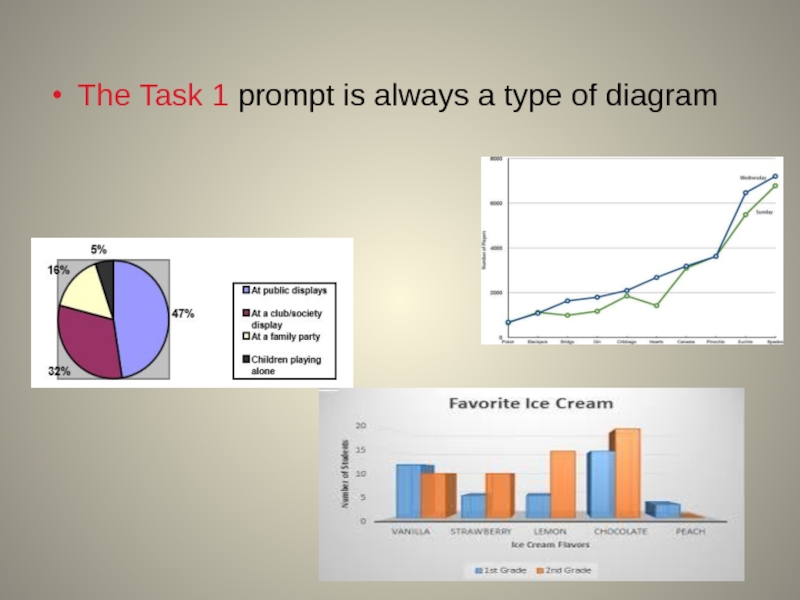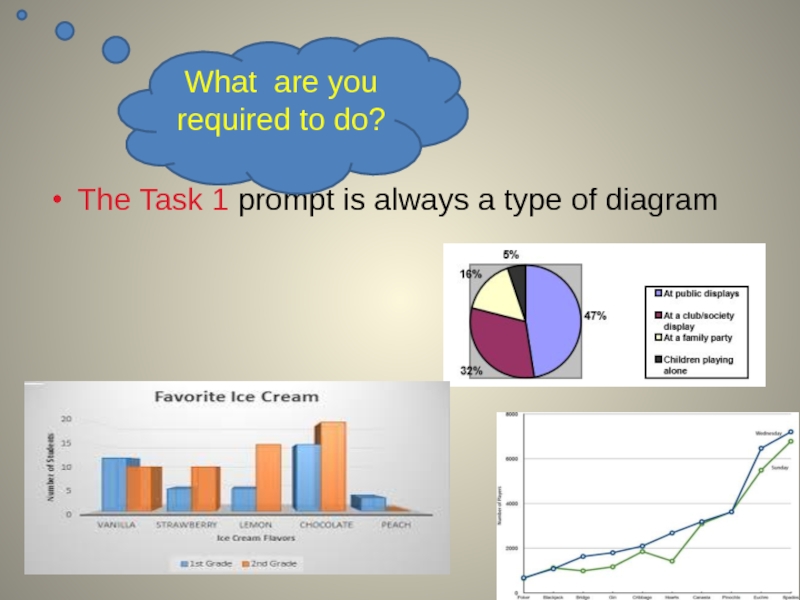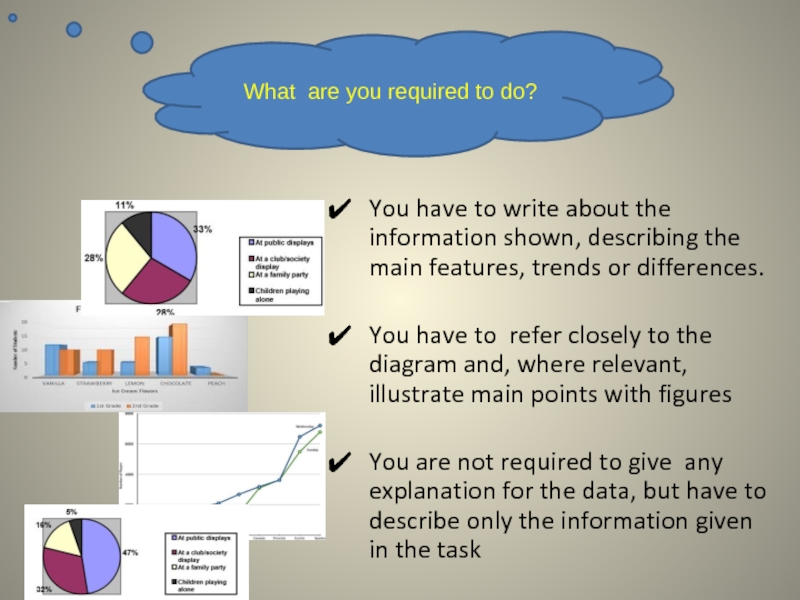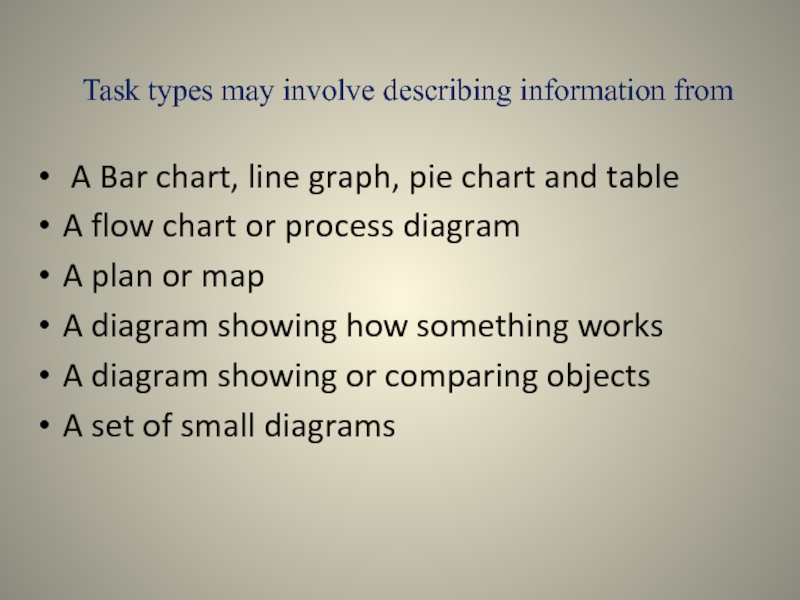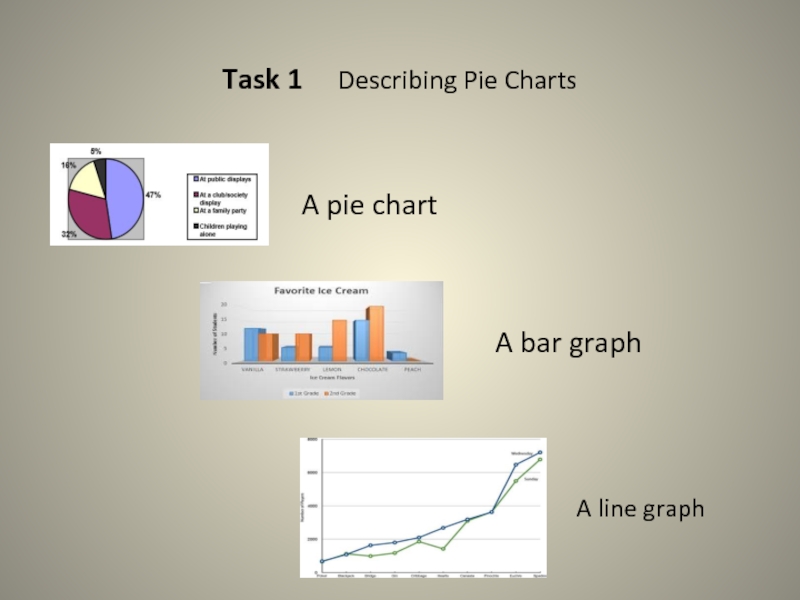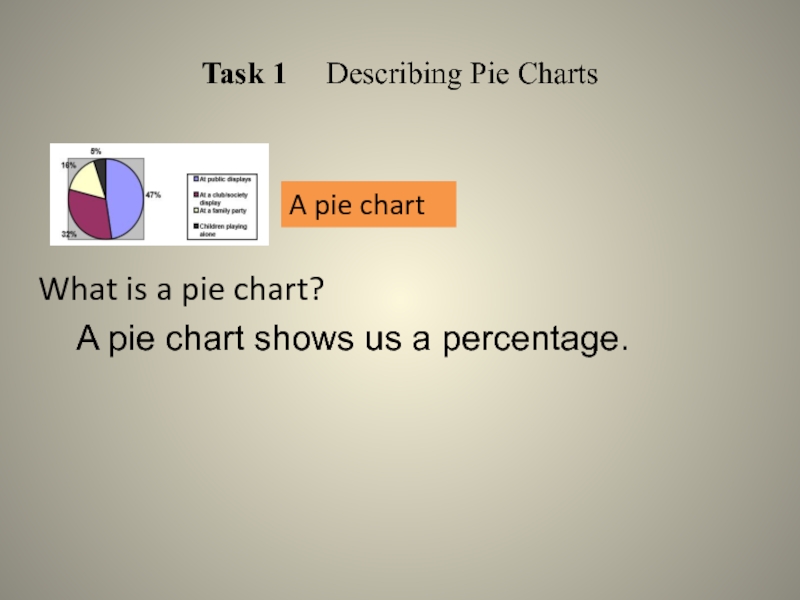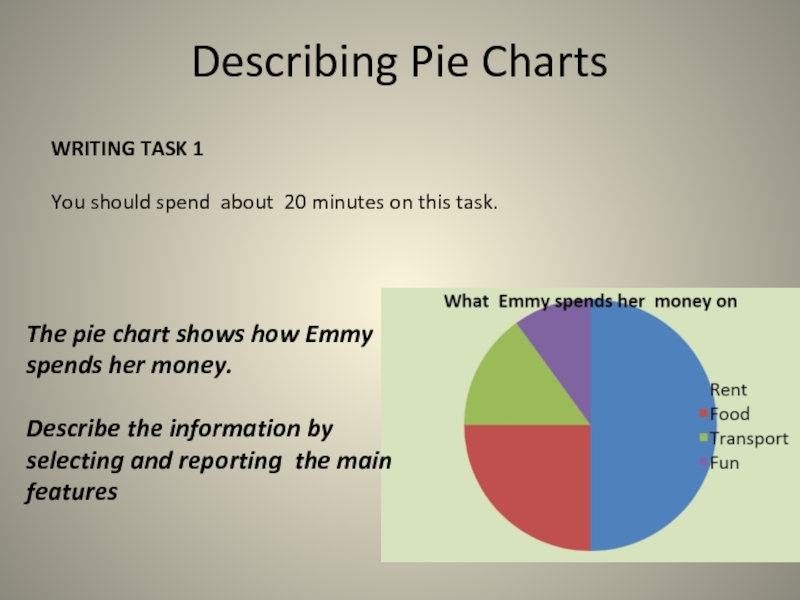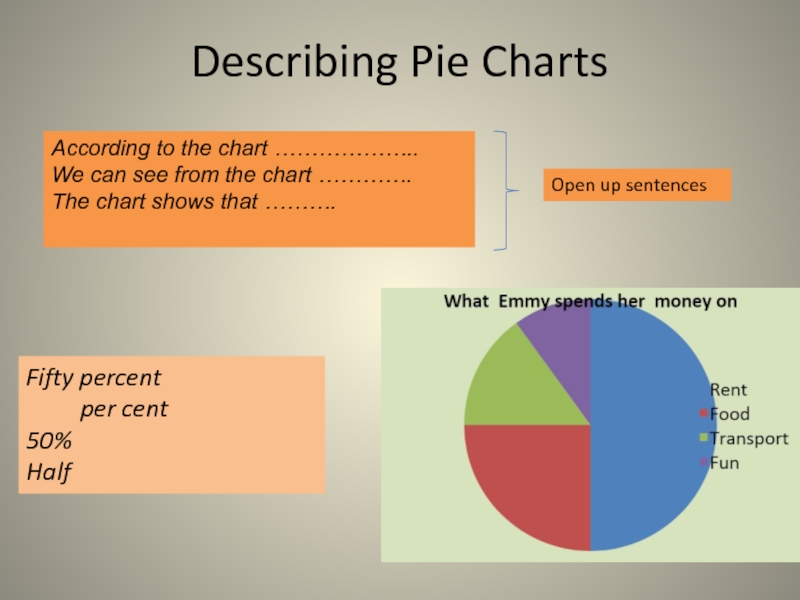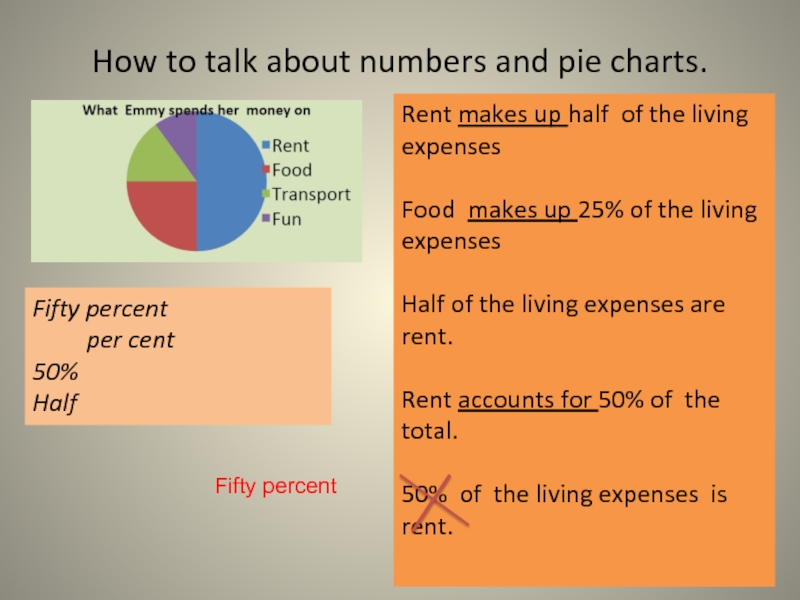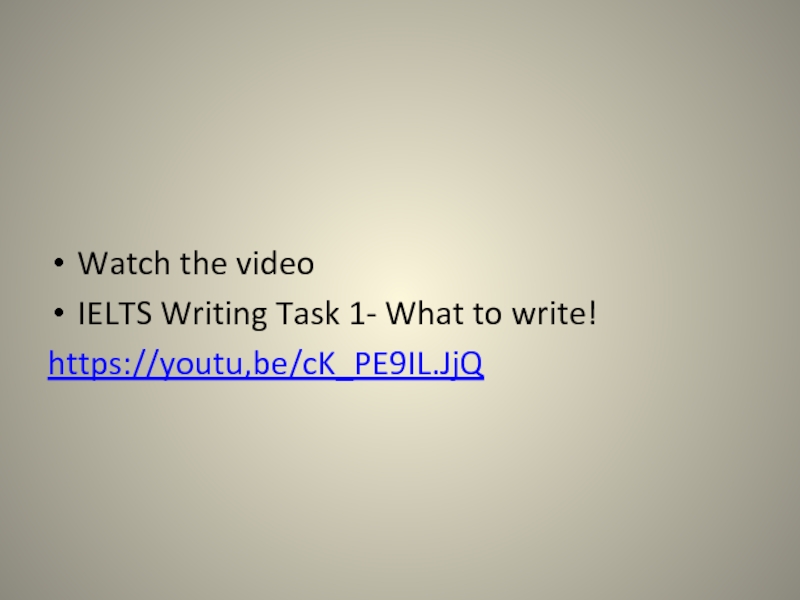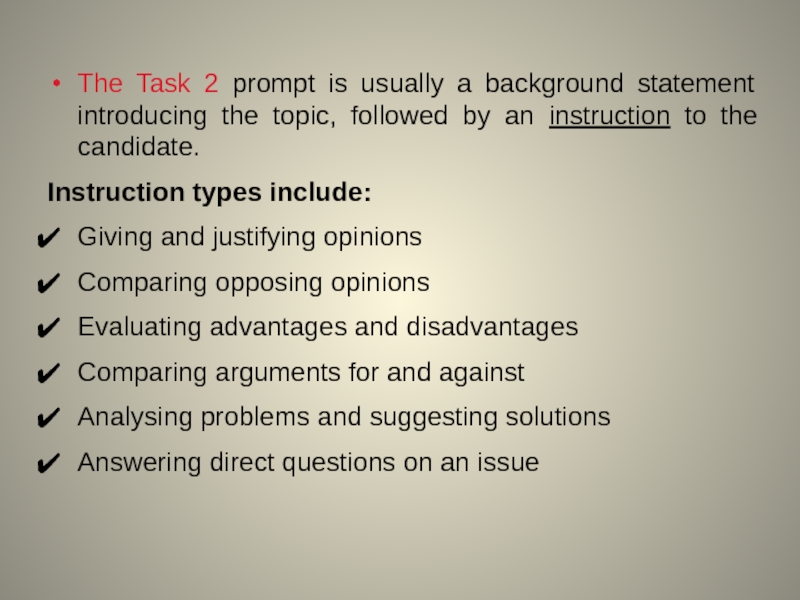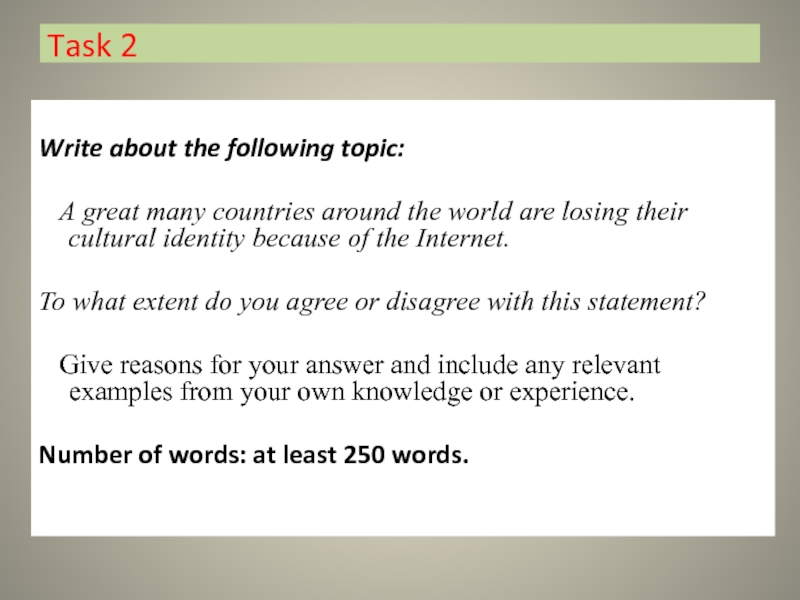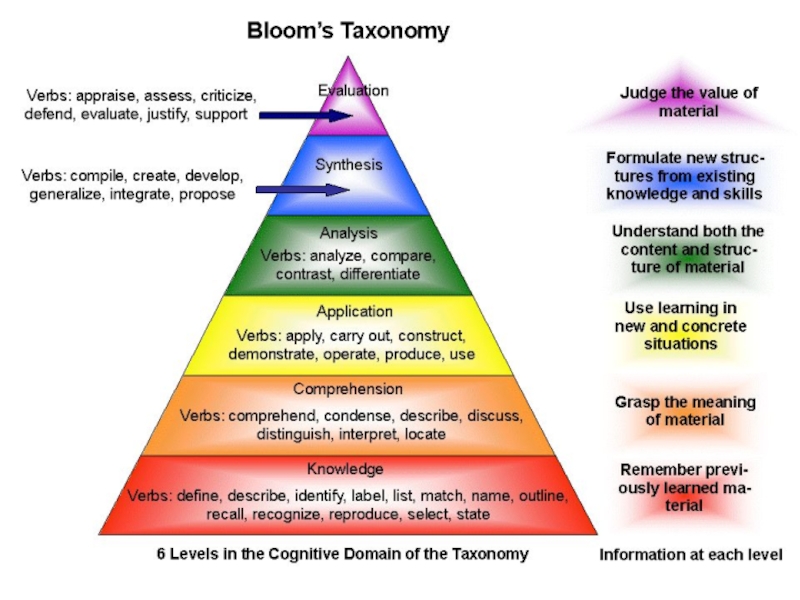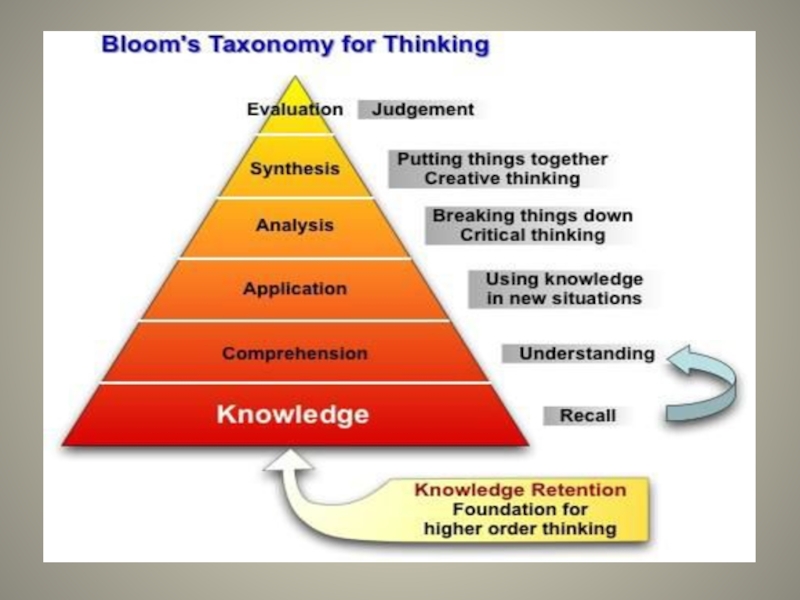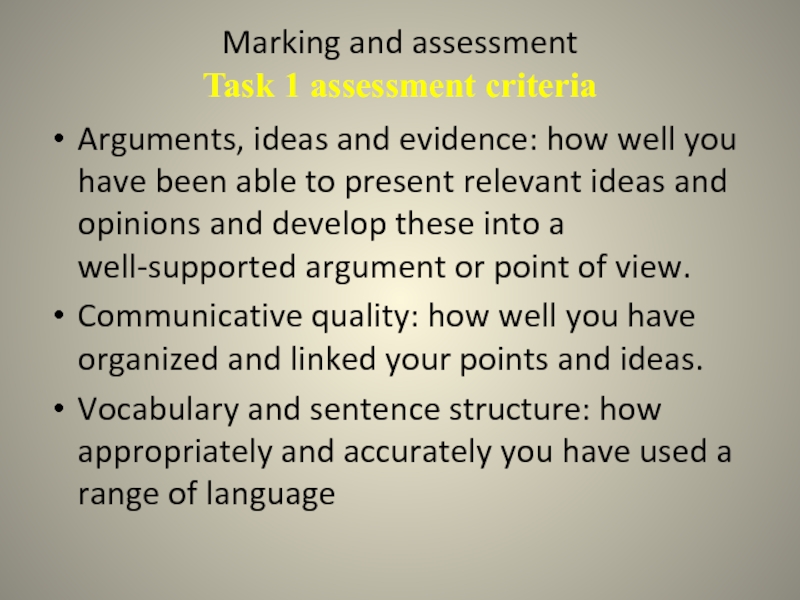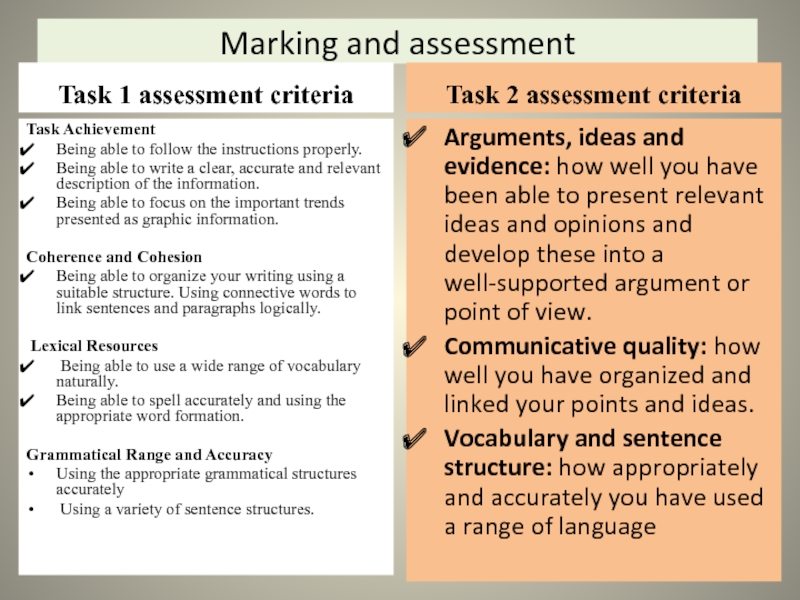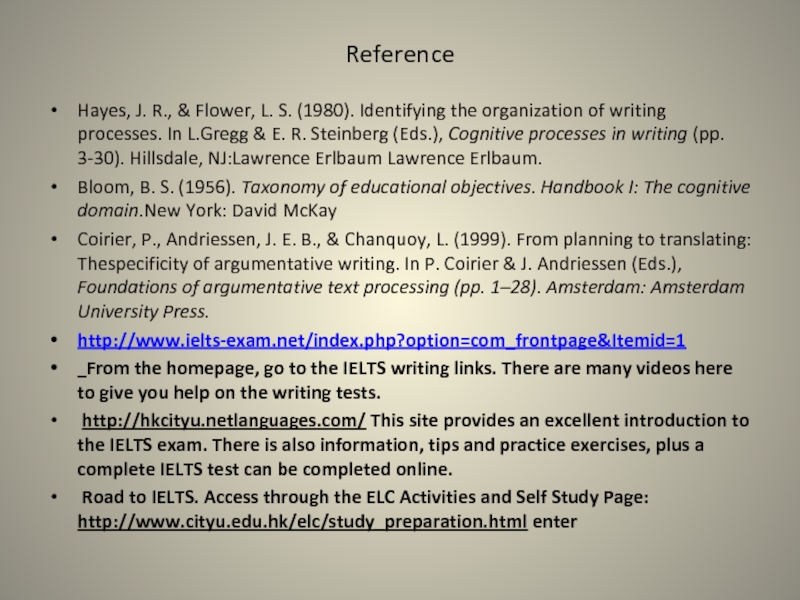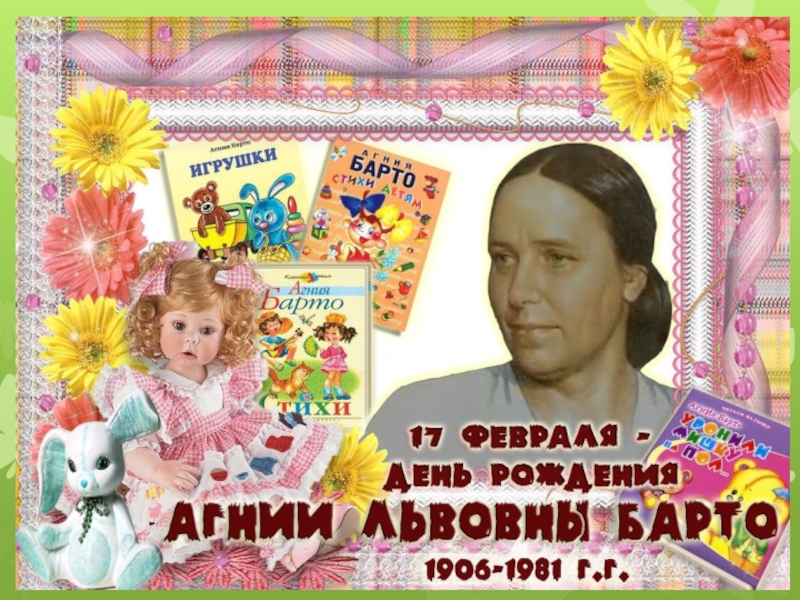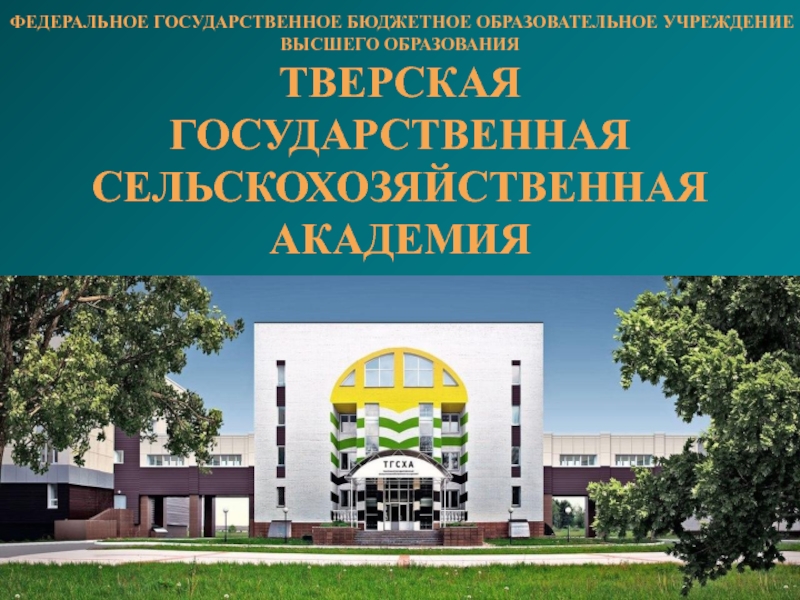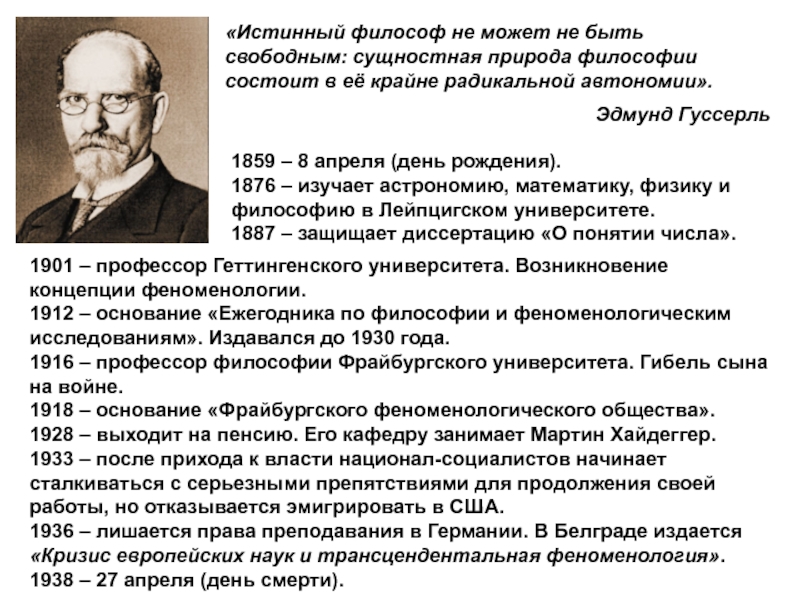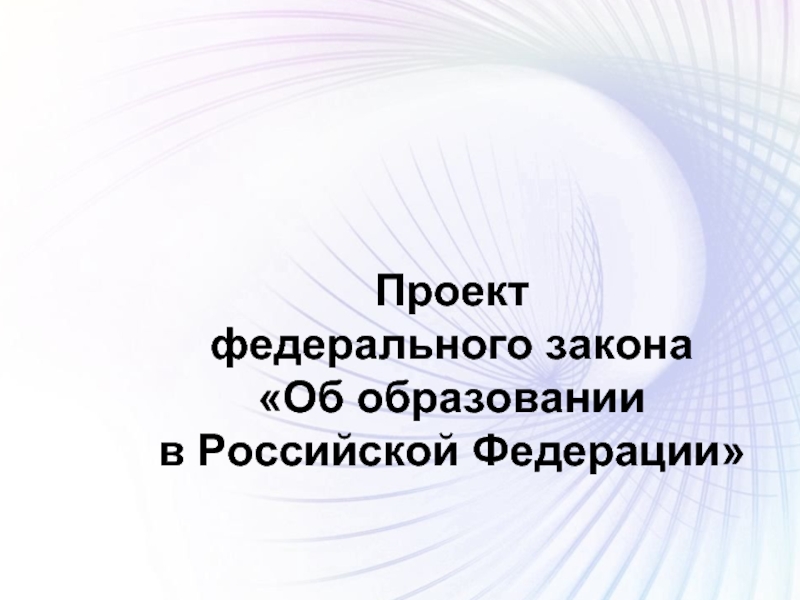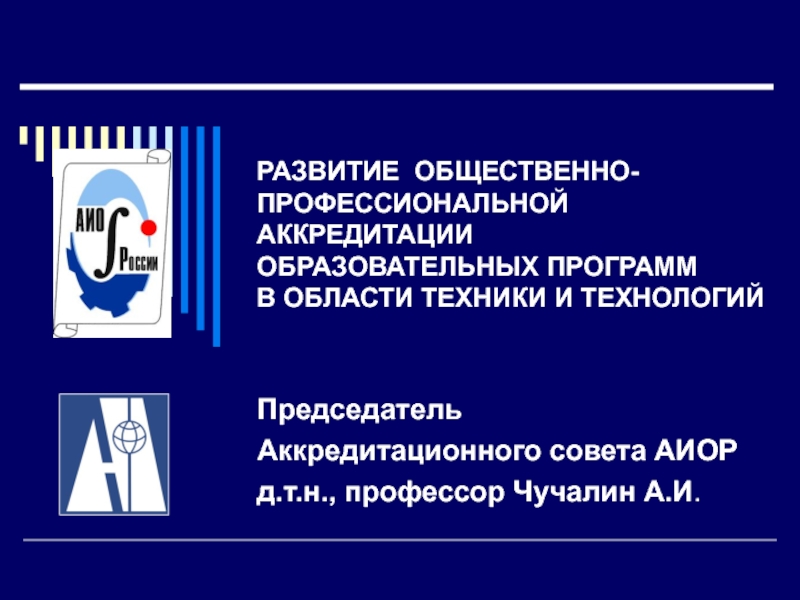- Главная
- Разное
- Дизайн
- Бизнес и предпринимательство
- Аналитика
- Образование
- Развлечения
- Красота и здоровье
- Финансы
- Государство
- Путешествия
- Спорт
- Недвижимость
- Армия
- Графика
- Культурология
- Еда и кулинария
- Лингвистика
- Английский язык
- Астрономия
- Алгебра
- Биология
- География
- Детские презентации
- Информатика
- История
- Литература
- Маркетинг
- Математика
- Медицина
- Менеджмент
- Музыка
- МХК
- Немецкий язык
- ОБЖ
- Обществознание
- Окружающий мир
- Педагогика
- Русский язык
- Технология
- Физика
- Философия
- Химия
- Шаблоны, картинки для презентаций
- Экология
- Экономика
- Юриспруденция
Time and organization. Content and task types. Marking and assessment презентация
Содержание
- 1. Time and organization. Content and task types. Marking and assessment
- 2. Competences: 1. Theoretical – worldview competence:
- 3. As a future
- 4. Cognitive Model of writing Cognitive models have
- 5. COGNITIVE WRITING MODEL Planning (coming up
- 6. Group 1
- 7. Group 2
- 8. Group 3
- 9. Group 4
- 10. Time and organization The Academic Writing Module
- 11. The Task 1 prompt is always a type of diagram
- 12. The Task 1 prompt
- 14. Task types may involve describing information
- 15. Task 1 Describing
- 16. Task 1 Describing Pie
- 17. Describing Pie Charts The pie chart
- 18. Describing Pie Charts Fifty percent
- 19. How to talk about numbers and pie
- 20. Watch the video IELTS Writing Task 1- What to write! https://youtu,be/cK_PE9IL.JjQ
- 21. The Task 2 prompt is usually
- 22. Task 2 Write about the following
- 25. Marking and assessment Task 1 assessment
- 26. Marking and assessment Task 1 assessment criteria
- 27. Reference Hayes, J. R., & Flower, L.
- 28. Thank you for attention
Слайд 1Theme: Writing Module
Subtheme(s):
1. Time and organization
2. Content and task types
3. Marking
Слайд 2Competences:
1. Theoretical – worldview competence:
-subject – methodological
2. Intercultural
- linguaculturological
-conceptual communicative
3. Professional orienting competence:
- cognitive-conceptual
-informational-accumulating
-reflexive –developing
4. Professional-specializing competence:
- notion-concept
-creative-research
- Metalanguage (terminology connected with the topic of the lecture)
Слайд 3
As a future foreign language MA in Education you
should know:
-
- content and task types of Writing Section of the International Language Test;
marking and assessment of Writing Section of the International Language Test
be able to:
describe a graph, chart, table, flow chart or diagram;
discuss an issue, question or opinion of general interest, and to give your own point of view;
use interactive technology in the formation of writing skills in learners
Слайд 4Cognitive Model of writing
Cognitive models have tended to define writing in
(McCutchen, Teske, & Bankston, 2008).
Writing is as much a matter of discovering or inventing the thought to be expressed in the text as it is a matter of expressing it in an appropriate and convincing way
(Flower & Hayes 1980a).
Слайд 5COGNITIVE WRITING MODEL
Planning (coming up with ideas, organizing, goal setting
Translating (takes the conceptual plan for the document and produces text expressing the planned content).
Reviewing (to improve it (revise) or correct errors (proofread).
Monitoring (metacognitive processes that link and coordinate planning, translating, and reviewing)
Hayes and Flower’ cognitive writing model
Слайд 7Group 2
The pie charts below show incidences of firework injuries in Great Britain in 1984 and 1998.
Summarize the information by selecting and reporting the main features, and make comparisons where relevant.
Number of words: at least 150 words.
Incidences of firework accidents in 1984.
Incidences of firework accidents in 1998.
Bar and line graphs, pie charts & tables
Слайд 8Group 3
Task 1 - Objects/how something works
See the example below.
The diagrams below show how to plumb in a washing machine.
Summarize the information by describing the main features and explaining how a washing machine works.
Слайд 9Group 4
Write about the following topic:
A great many countries around the world are losing their cultural identity because of the Internet.
To what extent do you agree or disagree with this statement?
Give reasons for your answer and include any relevant examples from your own knowledge or experience.
Number of words: at least 250 words.
Слайд 10Time and organization
The Academic Writing Module consists of two different writing
Task 1 must be a minimum of 150 words and you spend no longer than 20 minutes on this.
Task 2 must be at least 250 words and carries two thirds of the marks, so it is recommended that you spend 40 minutes on this.
Слайд 13
What are you required to do?
You have to write about the
You have to refer closely to the diagram and, where relevant, illustrate main points with figures
You are not required to give any explanation for the data, but have to describe only the information given in the task
Слайд 14 Task types may involve describing information from
A Bar
A flow chart or process diagram
A plan or map
A diagram showing how something works
A diagram showing or comparing objects
A set of small diagrams
Слайд 16
Task 1 Describing Pie Charts
A pie chart
What is
A pie chart shows us a percentage.
Слайд 17Describing Pie Charts
The pie chart shows how Emmy spends her money.
Describe
WRITING TASK 1
You should spend about 20 minutes on this task.
Слайд 18Describing Pie Charts
Fifty percent
per cent
50%
Half
According
We can see from the chart ………….
The chart shows that ……….
Open up sentences
Слайд 19How to talk about numbers and pie charts.
Fifty percent
50%
Half
Rent makes up half of the living expenses
Food makes up 25% of the living expenses
Half of the living expenses are rent.
Rent accounts for 50% of the total.
50% of the living expenses is rent.
Fifty percent
Слайд 21
The Task 2 prompt is usually a background statement introducing the
Instruction types include:
Giving and justifying opinions
Comparing opposing opinions
Evaluating advantages and disadvantages
Comparing arguments for and against
Analysing problems and suggesting solutions
Answering direct questions on an issue
requires to discuss an issue, question or opinion of general interest, and to give your own point of view.
Слайд 22Task 2
Write about the following topic:
A great many countries
To what extent do you agree or disagree with this statement?
Give reasons for your answer and include any relevant examples from your own knowledge or experience.
Number of words: at least 250 words.
Слайд 25
Marking and assessment
Task 1 assessment criteria
Arguments, ideas and evidence: how well
Communicative quality: how well you have organized and linked your points and ideas.
Vocabulary and sentence structure: how appropriately and accurately you have used a range of language
Слайд 26Marking and assessment
Task 1 assessment criteria
Task Achievement
Being able to follow the
Being able to write a clear, accurate and relevant description of the information.
Being able to focus on the important trends presented as graphic information.
Coherence and Cohesion
Being able to organize your writing using a suitable structure. Using connective words to link sentences and paragraphs logically.
Lexical Resources
Being able to use a wide range of vocabulary naturally.
Being able to spell accurately and using the appropriate word formation.
Grammatical Range and Accuracy
Using the appropriate grammatical structures accurately
Using a variety of sentence structures.
Task 2 assessment criteria
Arguments, ideas and evidence: how well you have been able to present relevant ideas and opinions and develop these into a well-supported argument or point of view.
Communicative quality: how well you have organized and linked your points and ideas.
Vocabulary and sentence structure: how appropriately and accurately you have used a range of language
Слайд 27Reference
Hayes, J. R., & Flower, L. S. (1980). Identifying the organization
Bloom, B. S. (1956). Taxonomy of educational objectives. Handbook I: The cognitive domain.New York: David McKay
Coirier, P., Andriessen, J. E. B., & Chanquoy, L. (1999). From planning to translating: Thespecificity of argumentative writing. In P. Coirier & J. Andriessen (Eds.), Foundations of argumentative text processing (pp. 1–28). Amsterdam: Amsterdam University Press.
http://www.ielts-exam.net/index.php?option=com_frontpage&Itemid=1
From the homepage, go to the IELTS writing links. There are many videos here to give you help on the writing tests.
http://hkcityu.netlanguages.com/ This site provides an excellent introduction to the IELTS exam. There is also information, tips and practice exercises, plus a complete IELTS test can be completed online.
Road to IELTS. Access through the ELC Activities and Self Study Page: http://www.cityu.edu.hk/elc/study_preparation.html enter
